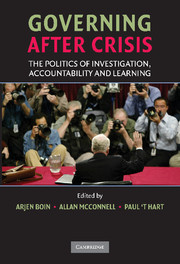Book contents
- Frontmatter
- Contents
- List of illustrations
- List of tables
- Contributors
- Introduction
- Part I Crisis-induced accountability
- Part II Crisis-induced policy change and learning
- 7 The 1975 Stockholm embassy seizure: crisis and the absence of reform
- 8 The Walkerton water tragedy and the Jerusalem banquet hall collapse: regulatory failure and policy change
- 9 Learning from crisis: NASA and the Challenger disaster
- 10 September 11 and postcrisis investigation: exploring the role and impact of the 9/11 Commission
- Conclusion
- Index
- References
8 - The Walkerton water tragedy and the Jerusalem banquet hall collapse: regulatory failure and policy change
Published online by Cambridge University Press: 04 June 2010
- Frontmatter
- Contents
- List of illustrations
- List of tables
- Contributors
- Introduction
- Part I Crisis-induced accountability
- Part II Crisis-induced policy change and learning
- 7 The 1975 Stockholm embassy seizure: crisis and the absence of reform
- 8 The Walkerton water tragedy and the Jerusalem banquet hall collapse: regulatory failure and policy change
- 9 Learning from crisis: NASA and the Challenger disaster
- 10 September 11 and postcrisis investigation: exploring the role and impact of the 9/11 Commission
- Conclusion
- Index
- References
Summary
Introduction: a puzzle emerging from tragedy
Risk regulation is a key feature of modern, complex, industrial and postindustrial societies. Reasons for the growth of such regimes are contested (see, e.g. Douglas and Wildavsky 1983; Beck 1999; Jordana and Levi-Faur 2004), but their ‘formal’ roles in systems of governance are clear. As Hood et al. (2001: 3) suggest, risk regulation is ‘governmental interference with market or social processes to control potential adverse consequences to health’. Arguably therefore, the greatest blow to a regulatory policy regime is being implicated as a causal factor in crisis or disaster. With policy legitimacy damaged and operational regulatory matters proving insufficient for the task, it would be logical to assume that liberal democratic processes of inquiry and accountability in the aftermath of crisis/disaster would lead to mature lesson-drawing processes and culminate in regulatory reforms. Indeed, with such high salience and prominence given to the protection of public health, it may be difficult to imagine a regulatory regime which does not engage in policy reforms aimed at restoring operational efficacy and reputational legitimacy of regulators and policy overseers alike.
Herein lies the ‘puzzle’ addressed by this chapter. We tackle two cases of regulatory failure identified as significant causal factors in tragedies, yet vastly different policy outcomes were produced as a result of investigation and lesson drawing.
- Type
- Chapter
- Information
- Governing after CrisisThe Politics of Investigation, Accountability and Learning, pp. 208 - 231Publisher: Cambridge University PressPrint publication year: 2008
References
- 1
- Cited by



